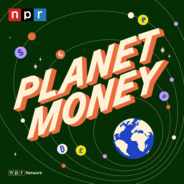Givewell is a nonprofit organization that gives money to “save or improve the most lives per dollar.” Part of their whole thing is a rigorous research process with copious and specific datapoints. So, in the chaotic wake of USAID’s gutting, they scrambled to figure out if they could fund the kind of projects USAID used to.Today on the show: GiveWell let us in on their decision-making process, as they try to reconcile the urgency of the moment with their normal diligence. We get to watch as they decide if they can back one project, to support health facilities in Cameroon.Pre-order the Planet Money book and get a free gift. / Subscribe to Planet Money+Listen free: Apple Podcasts, Spotify, the NPR app or anywhere you get podcasts.Facebook / Instagram / TikTok / Our weekly Newsletter.This episode was hosted by Mary Childs. It was produced by Sam Yellowhorse Kesler. It was edited by Marianne McCune, fact-checked by Vito Emanuel, and engineered by Jimmy Keeley with help from Robert Rodriguez. Planet Money’s executive producer is Alex Goldmark. Learn more about sponsor message choices: podcastchoices.com/adchoicesNPR Privacy Policy

Wirtschaft
Planet Money Folgen
Wanna see a trick? Give us any topic and we can tie it back to the economy. At Planet Money, we explore the forces that shape our lives and bring you along for the ride. Don't just understand the economy – understand the world.Wanna go deeper? Subscribe to Planet Money+ and get sponsor-free episodes of Planet Money, The Indicator, and Planet Money Summer School. Plus access to bonus content. It's a new way to support the show you love. Learn more at plus.npr.org/planetmoney
Folgen von Planet Money
355 Folgen
-
Folge vom 27.11.2025Saving lives with fewer dollars
-
Folge vom 21.11.2025The Consumer Sentiment vs. Consumer Spending PuzzleWherever consumer sentiment goes, consumer spending usually goes too. They’re like buddies that do everything together. Consumer sentiment wants a hair cut, its buddy consumer spending does too.But lately, these friends are drifting apart.While consumer sentiment about the economy is down … spending remains strong. And not just that… Interest rates are still high, inflation is growing, tariffs have made the prices of goods go up. And yet, consumer spending looks good. What gives?Today - a consumer spending mystery. Is the economy actually healthy? Or is something distorting our view of the economy?Pre-order the Planet Money book and get a free gift. / Subscribe to Planet Money+Listen free: Apple Podcasts, Spotify, the NPR app or anywhere you get podcasts.Facebook / Instagram / TikTok / Our weekly Newsletter.This episode was hosted by Sarah Gonzalez and Kenny Malone. It was produced by James Sneed. It was edited by Meg Cramer and fact-checked by Sierra Juarez. It was engineered by Debbie Daughtry and Kwesi Lee. Alex Goldmark is Planet Money's executive producer.Learn more about sponsor message choices: podcastchoices.com/adchoicesNPR Privacy Policy
-
Folge vom 19.11.2025Days of our TariffsTariffs. They’ve been announced, unannounced, re-announced, raised and lowered. It’s an on-going saga with billions at stake!On today’s episode, we run full-on at the twisty, turny drama of life with broad-based tariffs and tackle perhaps our most asked question: Are we, regular U.S. shoppers, feeling the tariffs yet? When we’re at the grocery store or the coffee shop, are we paying more for things because of the tariffs?We now have the data to get a very clear answer to that question. Plus, we hear a cautionary tale from our dear colleague James Sneed, who ordered a collectible doll and wound up with a surprise tariff bill at his door.Related episodes:Are Trump's tariffs legal? What is Temu?What "Made in China" actually meansPre-order the Planet Money book and get a free gift. / Subscribe to Planet Money+Listen free: Apple Podcasts, Spotify, the NPR app or anywhere you get podcasts.Facebook / Instagram / TikTok / Our weekly Newsletter.This episode was produced by Willa Rubin and edited by Jess Jiang. It was fact-checked by Sierra Juarez with research help from Vito Emanuel. It was engineered by Jimmy Keeley and Maggie Luthar. Alex Goldmark is our executive producer.Music: NPR Source Audio - “Mirror,” “Remorse,” “Endless,” “Secrets,” “Schmaltzy,” “Water Mirror.”Learn more about sponsor message choices: podcastchoices.com/adchoicesNPR Privacy Policy
-
Folge vom 15.11.2025The obscure pool of money the US used to bail out ArgentinaLast month, during the longest government shutdown in U.S. history, Treasury Secretary Scott Bessent announced that the United States had offered to functionally loan Argentina $20 billion. Despite the sums involved, this bailout required no authorization from Congress, because of the loan’s source: an obscure pool of money called the Exchange Stabilization Fund. The ESF is essentially the Treasury Department’s private slush fund. Its history goes all the way back to the Great Depression. But, in the 90 years since its creation, it has only been used one time at this scale to bailout an emerging economy: Mexico, in 1995. That case study contains some helpful lessons that can be used to make sense of Bessent’s recent move. Will this new credit line to Argentina work out as well as it did the last time we tried it? Or will Argentina’s economic troubles hamstring the Exchange Stabilization Fund forever?Pre-order the Planet Money book and get a free gift. / Subscribe to Planet Money+Listen free: Apple Podcasts, Spotify, the NPR app or anywhere you get podcasts.Facebook / Instagram / TikTok / Our weekly Newsletter.This episode was hosted by Keith Romer and Erika Beras. It was produced by Luis Gallo. It was edited by Eric Mennel and fact checked by Sierra Juarez. It was engineered by Cena Loffredo. Alex Goldmark is Planet Money’s executive producer.Learn more about sponsor message choices: podcastchoices.com/adchoicesNPR Privacy Policy
